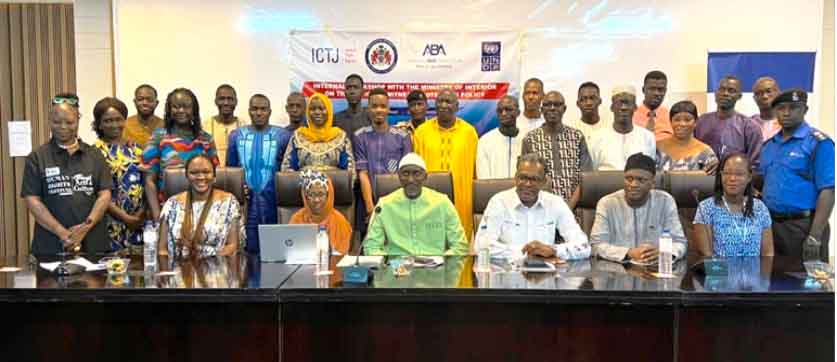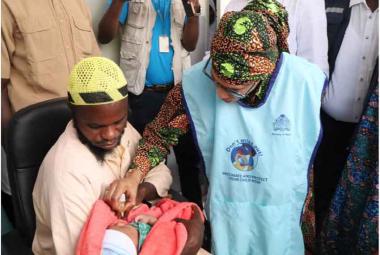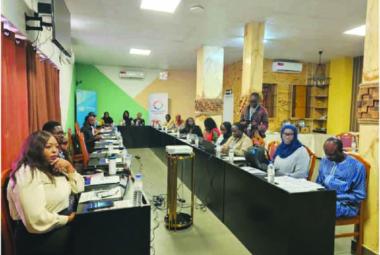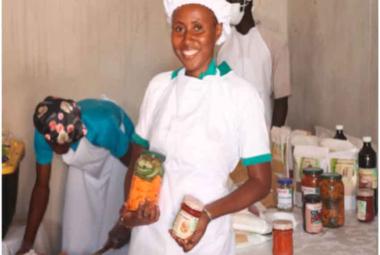By Bubacarr Gaye
The Ministry of Interior (MoI), in collaboration with the International Centre for Transitional Justice (ICTJ), American Bar Association and other stakeholders, recently conducted a consultation workshop on the implementation of the National Victims and Witness Protection Policy. The National Victims and Witness Protection Policy aims to ensure accountability for past crimes and prevent their recurrence. It equally seeks to address those challenges by safeguarding the rights and well-being of victims and witnesses, thereby fostering an environment conducive to truth telling and justice. The Deputy Permanent Secretary (Technical), Ms Mbayang Njie, delivering a speech on behalf of the Honourable Minister of Interior, stated that this policy would be pivotal in ensuring access to justice and respect for human rights. She explained that it would provide reliable and durable protection, legal and psychological support and robust physical protection to victims and witnesses who stand up for truth and justice. She emphasised the type and level of protection that victims and witnesses of serious crimes or human rights violations acquire is crucial to the success of every investigation and prosecution and stressed that the TRRC recommendations are not an exception.
DPS Mbayang postulated that the victim and witness protection policy would enhance accountability for serious crimes and atrocities while fostering a safe environment that will empower individuals to participate in legal processes without jeopardizing their well-being or security. “By guaranteeing victim and witness safety, the criminal justice system can effectively investigate and prosecute crimes and ensure that the rule of law is upheld.” She noted She concluded that, as the leading actor in implementing the policy, the Ministry of interior will endeavor to fulfil the responsibility with due diligence. She expressed hope that all participants will benefit from this important workshop and contribute to the legislation of the policy and its further implementation. Mr Didier Gbery Head of Program at the International Center for Transitional Justice in The Gambia alluded that the protection of victims and witnesses is an important mechanism in the fight against impunity, the protection of the rights of victims and witnesses, the preservation of the physical, moral and intellectual integrity of victims and witnesses, and the strengthening of a safe and reliable judicial system.
“It is important to note that the TRRC faced significant challenges in securing victims’ testimonies during the session on sexual violence, highlighting the essential need for protective measures throughout legal proceedings, whether judicial or otherwise,” he asserted. Executive Secretary of the National Human Rights Commission (NHRC), Dr. Saikou Kawsu Gassama, elucidated that the policy will enable law enforcement officers especially the police to assess and determine whether a victim or witness is at risk and how he/she could be protected. Dr Gassama stiffened the relevance of the policy in enhancing the safety of witnesses, strengthening the capacity and integrity of evidence obtained and instilling confidence in witnesses to ensure that they testify freely and confidently.
“The protection of witnesses and victims is imperative to the successful implementation of the TRRC recommendations on the prosecution of those who bear the greatest responsibilities of the human rights abuses and violations that occurred from July 1994 to January 2017. “As we stand at a pivotal moment in The Gambia’s history, on the threshold of accountability, healing and justice, it is with profound dedication and unwavering commitment that we support and fully endorse the adoption of a National Victims and Witness Protection Policy,” he concluded. On behalf of the Promoting Rights and Justice Activity in The Gambia, Fatou Bintou Sallah highlighted that these efforts are especially timely as The Gambia prepares to hold individuals accountable for some of the most serious human rights violations that took place during the regime of former President Jammeh.
“These violations, as identified by the Truth, Reconciliation, and Reparations Commission (TRRC) and acknowledged in the Government’s White Paper, highlight the need for careful coordination between judicial mechanisms, alleged perpetrators, and victims and witnesses. We hope that this new policy will be a crucial tool in safeguarding the rights of all those involved in these complex and often contentious processes,” she cited. Finally, she reaffirmed that the Promoting Rights and Justice Activity remains steadfast in supporting initiatives like this, which she said are vital to advancing human rights, the rule of law, and democratic governance in The Gambia.







